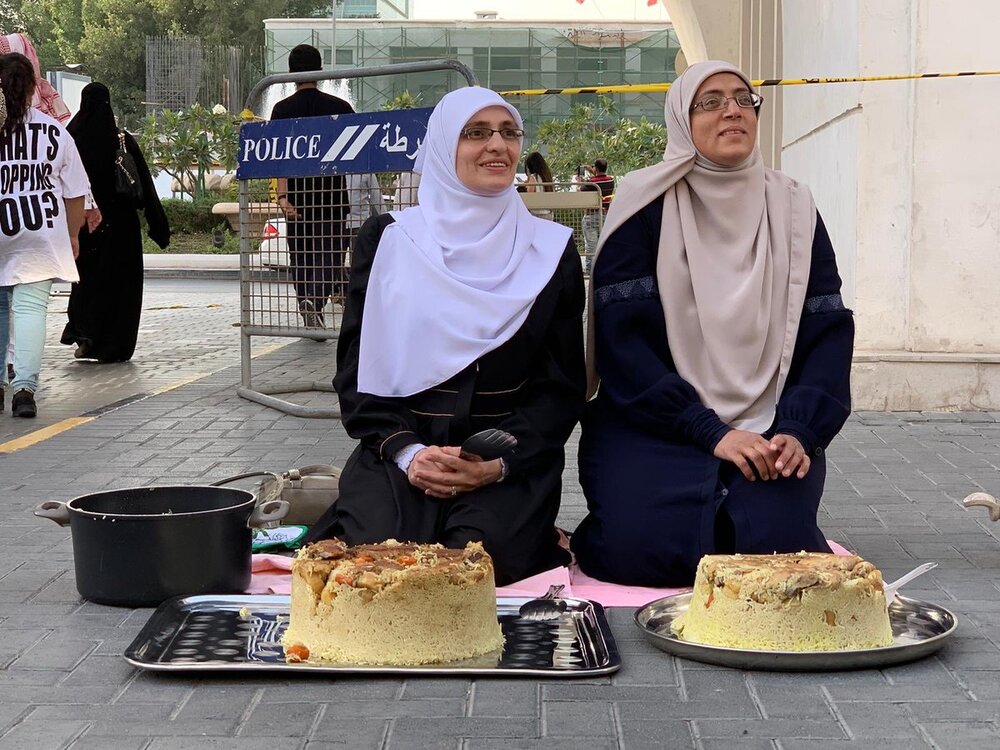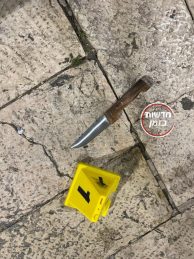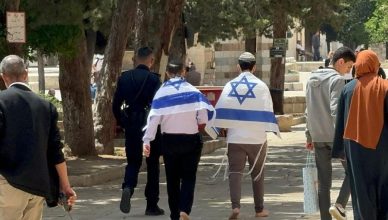The Palestinian dish Maqluba is no longer just a popular mealtime centerpiece but has become an emblem of resistance and defiance in Occupied Jerusalem.
The Maqluba a rice and meat dish served flipped upside down onto trays from cooking vessels was served widely recently inside Al-Aqsa Mosque compound amidst the ongoing volatile situation as the area is currently subject to a concentrated Israeli occupation campaign to Judaize it.
Fatema Khader 64 a Palestinian activist from Occupied Jerusalem stressed “We flip pots of Maqluba during this holy month of Ramadan to feed those who fast under the watchful eyes of the Israeli occupation police. This action is to protest the Israeli subjugation against us and to make a statement that this land is Palestinian” as Maqluba is one of the main dishes in Palestinian traditional cuisine. Fatema told us that they serve Maqluba as a symbolic representation of how Israeli policies and decisions against Palestinians will be flipped on their heads and become rendered meaningless.
Palestinian folklore says that the dish name dates back to the inspirational Muslim leader Saladin Alayoubi the founder of the Ayyubid dynasty. During Saladin’s Conquest and liberation of Jerusalem in 1187 Jerusalemites served him the dish which was called Bazenjaniya (Eggplant). He was amused by the way the dish was flipped upside down as it was served exclaiming “So this is Maqluba (upside Down)!” According to the legend henceforth Saladin’s renaming became widely used. While this is merely a folktale and there is no concrete evidence to either assert or deny the validity of the story nor is it known when the name ‘Maqluba’ first appears in history but what has been demonstrated by food historians and researchers is that Maqluba is an ancient dish served during the Umayyad and Abbasid eras in Palestine.
What makes the Maqluba so momentous is that it is prepared with the intention to be served at gatherings not for individuals. The researcher Momen Barakah says that the significance of the Maqluba is in being a dish that is meant to be eaten by a group so it is often a meal around which the family gathers evoking its heritage and popular culinary customs. The dish also has a historical dimension and has been linked to the liberation of Jerusalem from the crusaders. Barakah notes that these symbols are employed by the Palestinians in the third holiest places in Islam.
Since 2015 Maqluba has become the main meal of the Murabiteen the self-appointed guardians of Al-Aqsa teachers preachers and anyone come to pray particularly in Ramadan. Even gathering for a meal causes ire to the Israeli authorities who impose restrictions on Al-Aqsa interrogating those who serve it in the holy site.
The ongoing incidences between the Israeli occupation authorities and Jerusalemite activists Khadija Khwais and Hanadi Hilwani demonstrates the extent of Israeli restrictions: Khwais and Hilwani used to cook then serve the worshipers inside Al-Aqsa Mosque especially during Ramadan. Both have been subject to deportation from Jerusalem and faced bans from entering Al-Aqsa Mosque on multiple occasions. These days although they are still barred they still cook and serve those who come to pray in Al-Aqsa Mosque at the Al-Aqsa gates under the eyes of the Israeli occupation forces.
The researcher Barakah confirms “The occupation tries to uproot any form of Palestinian defiance and steadfastness. They understand the significance of this dish how it represents the Palestinian heritage and identity they seek to eliminate by all means.” He continues “The Jerusalemite women who cook this dish face deportation and bans from Al-Aqsa for the apparent violation of cooking Maqluba justifiable to be charged in the Israeli courts.”
The meal of defiance irritates the Israeli occupation authorities who are infuriated with the Palestinians’ consistent attempts to resist the occupation and preserve their identity and heritage.
– Wafa Aludaini is a Gaza-based journalist and activist. She contributed this article to the Palestinian Information Center.














